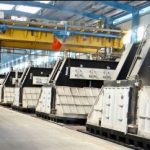Bhubaneswar: Tata Steel crude steel production in 3Q FY2025 stood at 5.68 million tons. Production was up 8% QoQ and 6% YoY, aided by the commissioning of the 5 MTPA blast furnace at Kalinganagar in September. The new blast furnace is presently operating at ~8,000 tpd and the ramp up to rated capacity is underway.
For 9MFY25, production rose 5% YoY to 16.2 million tons.
Tata Steel India deliveries were the “best ever 3Q’ sales at 5.29 million tons. Deliveries were up 4% QoQ and 8% YoY, aided by steady sales in domestic market and strategic presence in exports.
For 9MFY25, deliveries were at around 15.3 million tons, with 4% YoY growth in domestic deliveries.
Key highlights of domestic deliveries for 9MFY25 ◦ Automotive & Special Products’ vertical deliveries were ~-2.3 million tons, driven by 3% YoY growth in high end products. Continuous Annealing Line (CAL), part of 2.2 MTPA CRM complex at Kalinganagar, was commissioned in December and has received facility approvals from some of the major OEMs. ◦ ‘Branded Products & Retail’ vertical deliveries were ~5.1 million tons, up 6% YoY aided by performance of well-established brands. Tata Tiscon (Retail brand) deliveries were up ~20% YoY and Tata Steelium (cold rolled brand for SMEs) deliveries were up 7% YoY. ◦ Ilndustrial Products & Projects’ vertical deliveries were -5.3 million tons and were broadly steady on YoY basis. However, value accretive segments such as Engineering and Ready-to-use solutions registered double digit growth. ◦ Revenues from Tata Steel Aashiyana, an e-commerce platform for Individual Home Builders, were up 37% YoY to Rs. 2,154 crores. Growth has been consistently aided by various strategic initiatives to enhance consumer experience Tata Steel Netherlands liquid steel production for the quarter stood at 1.76 million tons and deliveries were 1.53 million tons. Deliveries include volumes to UK operations of around 0.12 million tons. For 9MFY25, deliveries were up 16% YoY, primarily due to improved production. Following closure of the blast furnaces at the end of 2QFY25, TSUK has successfully reconfigured its supply chain to continue servicing customers via downstream processing of purchased substrate. For 9MFY25, deliveries stood at 1.87 million tons and were adversely impacted by subdued demand dynamics.






